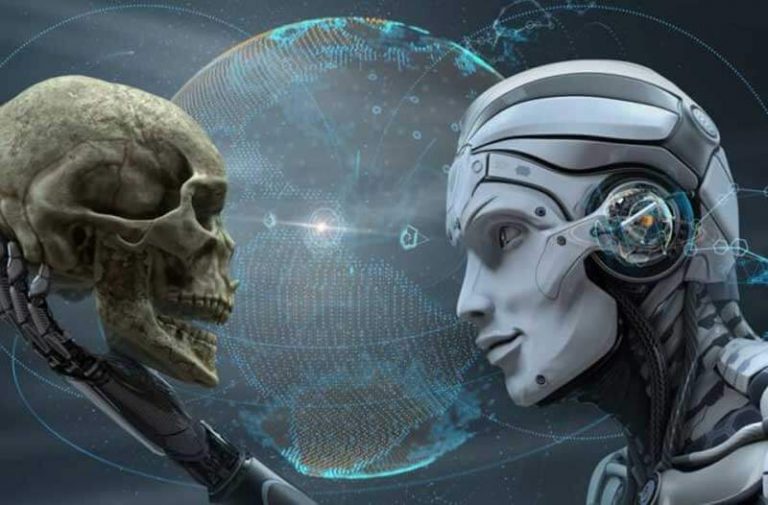
And yet we continue to dream that some deus in machina, a god in the machine, could appear as if by magic to save us from ourselves.
By Nazarul Islam
I have lived in America for nearly a quarter century. My children grew up into adulthood in Florida. And so did technology, in all its applications and wondrous creativities. Life in this country is focused, and goal oriented. One understands here that time, indeed has precious value and need not be wasted.
Not long ago, my wife Nuzhat and I were driving in North Carolina amazed yet again that the GPS technology on our phones could guide us through a thicket of highways, around road accidents, and toward our precise destination. The artificial intelligence (AI) behind the soothing voice telling us where to turn has replaced passenger-seat navigators, maps, even traffic updates on the radio.
How on earth did we survive before this technology arrived in our lives? We survived, of course, but were quite literally lost some of the time.
My reverie was interrupted by a toll booth. It was empty, as were all the other booths at this particular toll plaza. Most cars zipped through with E-Z passes, as one automated device seamlessly communicated with another. Unfortunately, our rental car didn’t have one.
So I prepared to pay by credit card, but the booth lacked a credit-card reader.
Okay, I thought, as I pulled out my wallet, I’ll use cash to cover the $3.25.
As it happened, that booth took only coins and who drives around with 13 quarters in his or her pocket?
I would have liked to ask someone that very question, but I was, of course, surrounded by mute machines. So I simply drove through the electronic stile, preparing myself for the bill that would arrive in the mail once that plaza’s automated system photographed and traced our license plate.
In a thoroughly mundane fashion, I’d just experienced the age-old conflict between the limiting and liberating sides of technology. The arrowhead that can get you food for dinner might one day, ultimately end up lodged in your own skull. And the car that transports you to a beachside holiday contributes to the rising tides—by way of carbon emissions and elevated temperatures—that may someday wash away that very coastal gem of a place.
The laptop computer that plugs you into the cyber-world also serves as the conduit through which hackers can steal your identity and zero out your bank account.
In the previous century, technology reached a true watershed moment when humans, harnessing the power of the atom, also acquired the capacity to destroy the entire planet. Now, thanks to AI, technology is hurtling us toward a new inflection point.
Science-fiction writers and technologists have long worried about a future in which robots, achieving sentience, take over the planet. The creation of a machine with human-like intelligence that could someday fool us into believing it’s one of us has often been described, with no small measure of trepidation, as the “singularity.”
Respectable scientists like Stephen Hawking have argued that such a singularity will, in fact, mark the “end of the human race.”
This will not be some impossibly remote event like the sun blowing up in a supernova several billion years from now. According to one poll, AI researchers reckon that there’s at least a 50-50 chance that the singularity will occur by 2050. In other words, if pessimists like Hawking are right, it’s odds on that robots will dispatch humanity before the climate crisis does.
Neither the artificial intelligence that powers GPS nor the kind that controlled that frustrating toll plaza has yet attained anything like human-level intelligence—not even close. But in many ways, such dumb robots are already taking over the world. Automation is currently displacing millions of workers, including those former tollbooth operators.
Again, the “Smart” machines like unmanned aerial vehicles have become an indispensable part of waging war. AI systems are increasingly being deployed to monitor our every move on the Internet, through our phones, and whenever we venture into public space. Algorithms are replacing teaching assistants in the classroom and influencing sentencing in courtrooms. Some of the loneliest among us have already become dependent on robot pets.
As AI capabilities continue to improve, the inescapable political question will become: To what extent can such technologies be curbed and regulated? Yes, the nuclear genie is out of the bottle, as are other technologies—biological and chemical—capable of causing mass destruction of a kind previously unimaginable on this planet. With AI, however, that day of singularity is still in the future, even if a rapidly approaching one. It should still be possible, at least theoretically, to control such an outcome before there’s nothing to do but play the whack-a-mole game of non-proliferation after the fact.
As long as humans continue to behave badly on a global scale—war, genocide, planet-threatening carbon emissions—it’s difficult to imagine that anything we create, however intelligent, will act differently. And yet we continue to dream that some deus in machina, a god in the machine, could appear as if by magic to save us from ourselves.
Courtesy: Technological World
[author title=”Nazarul Islam ” image=”https://sindhcourier.com/wp-content/uploads/2021/05/Nazarul-Islam-2.png”]The Bengal-born writer Nazarul Islam is a senior educationist based in USA. He writes for Sindh Courier and the newspapers of Bangladesh, India and America. He is author of a recently published book ‘Chasing Hope’ – a compilation of his 119 articles.[/author]